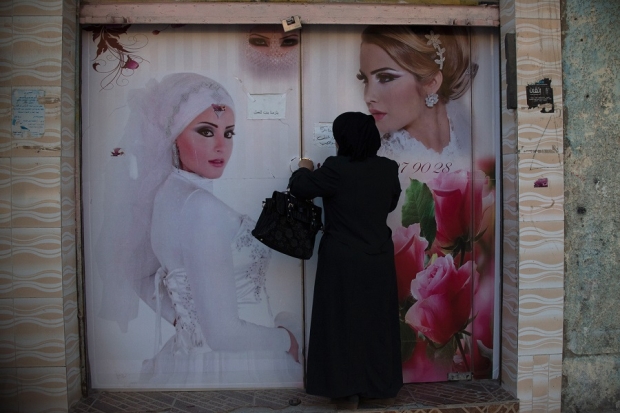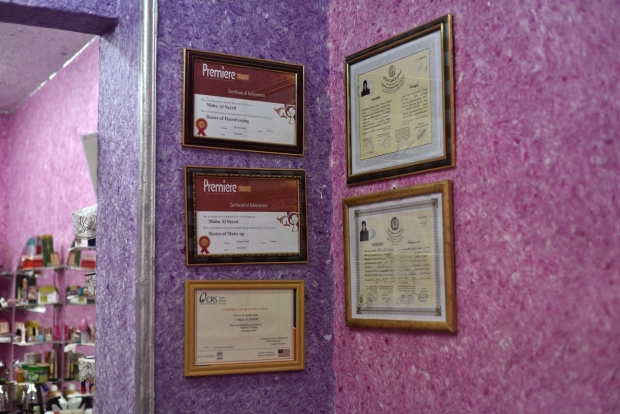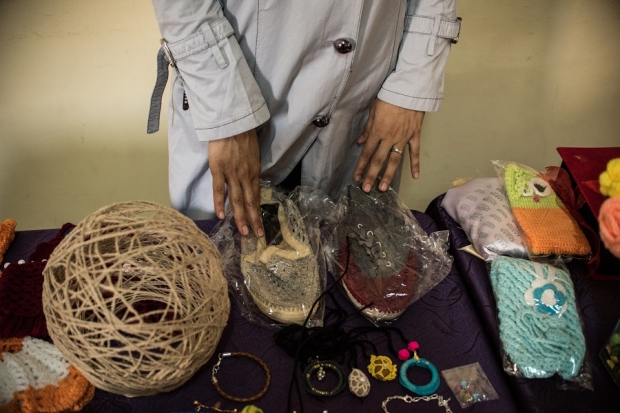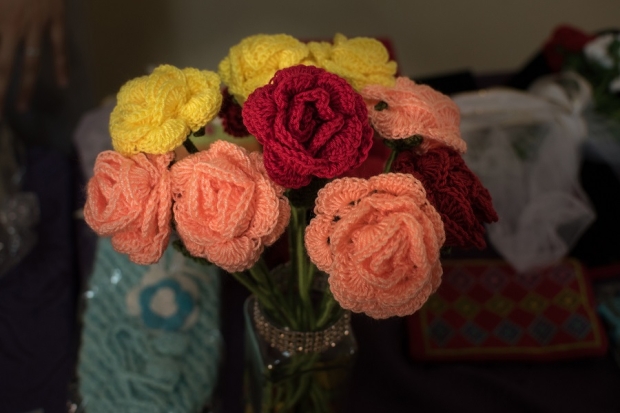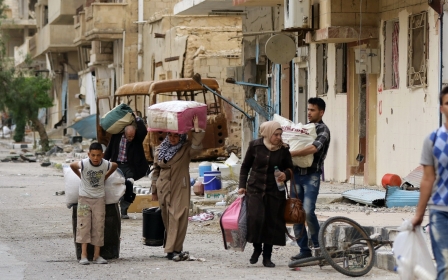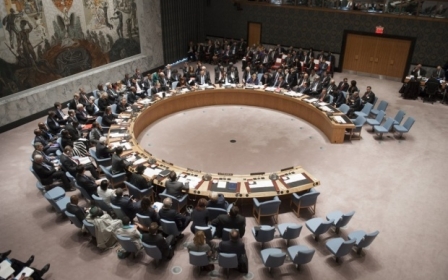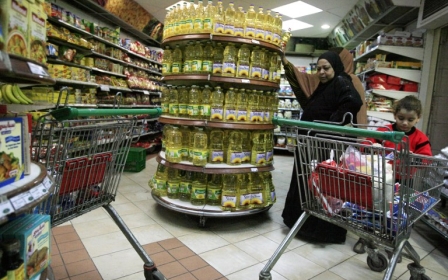Starting over: The sky is the limit for Syrian businesswomen in Egypt

CAIRO - As a child in Damascus, Maha al-Sayyed always looked forward to going to the hairdresser with her grandmother. The atmosphere, the smell of nail polish, and the voices of women socialising were addictive to Sayyed, who loved leaving the salon with a new look every time.
Growing up, she dreamt of opening up her own beauty parlour. For 13 years, she took courses, attended workshops and developed her hair styling skills until she eventually opened up her own place in Damascus. But as the war in Syria escalated, after only three short months of being open she was forced to shut down her business and flee to Egypt in 2012.
“I didn’t get a chance to enjoy the shop,” she told MEE as she sat waiting for customers inside her new shop in Cairo, decorated with bright pink and purple wall paper.
“The fighting intensified where we were; we were in the suburbs of Damascus, and so we had to pick up all we could and leave,” Sayyed said.
Upon her arrival in Egypt, she managed to get a job after just one month. Yet dealing with low salaries, long working hours and generally exploitative bosses led Sayyed to reignite her dream of running her own salon again.
According to a recent United Nations Development Programme (UNDP) study entitled Jobs Make the Difference, Syrian refugees and their Egyptian partners have invested a total of $800m into the Egyptian economy since 2011.
The number, as UNDP notes, is likely to be much higher as many people do not officially register their businesses in Egypt.
The study also briefly mentions that for about 40 percent of refugee households in countries such as Egypt, Jordan, and Turkey, Syrian women are now the main breadwinners.
'I am helping create employment opportunities for other women'
- Maram Ahmed, owns a beauty salon
One of them is Maram Ahmed, a businesswoman who also runs a salon in Cairo and is planning on opening up a gym. She was running similar businesses in Damascus before the unrest.
“I have a business mind, and I have always been interested in opening up projects," Ahmed, who did not want to use her real name, told MEE.
She opened a separate barbershop for her husband and son to work in, in addition to the women's beauty salon.
“I love business, projects, and trade. I opened a small barbershop project for my husband and son to cut hair and it has been expanding slowly,” she said, explaining that her husband appreciates her trade and administrative skills.
For Amira Marzouk and Samar Kadi, it was absolute necessity that drove them to pursue their projects.
“I would have never gone out to work back in Syria,” said Marzouk, who sells handmade crocheted clothes, bags, decorations, boxes, and other products.
'Syrian women have faced so many challenges. We started from zero, but we were able to resist'
- Amira Marzouk, artisan of crocheted items
“Before we were all displaced, a lot of us who had depended on our husbands [financially], lost them in this war," she said.
“So we depended on these projects and while they may seem small in name [or in scope], they are big for us,” she added.
'I wasn’t taken seriously'
It was not easy for these Syrian women to find a place for themselves in the Egyptian market, after sometimes being subjected to sexual harassment and discrimination.
“There was a woman once who refused to have me work on her hair because I am Syrian. It really upset me. I had been working at another hair salon then and the owner did nothing; he just got another girl to do her hair,” Sayyed told MEE.
Marzouk had to deal with sexual harassment and struggled to find work before embarking on her own project.
“As women we didn’t have this familiarity with the market. So starting out, I attempted to just go into shops to display my work to the owners, but I was received with a lot of disrespect and I wasn’t taken seriously," Marzouk said. "I only entered two stores and decided not to expose myself to this treatment again."
With only a secondary school diploma, Marzouk could not find a job easily, so she decided to start her project. But with five children to feed, it was difficult to invest any small profit she made back in her new business.
“Syrian women have faced so many challenges. We started from zero, but we were able to resist," she said.
For the last six months, Kadi, a mother of two, has been working on creating different cleaning detergents, which she sells to homemakers, restaurants and shops.
“I never imagined I would become a widow. I never had to work before and my life in Syria had been, to a large extent, luxurious. I barely had to go get groceries,” Kadi told MEE.
'I never had to work before and my life in Syria had been, to a large extent, luxurious'
- Samar Kadi, makes and sells cleaning detergents
After her husband died from a stroke a year and a half ago in Egypt, Kadi began working as a schoolteacher. After some time, she decided she needed to be more available for her children and began her own cooking project from home. Eventually, she realised that the Syrian food industry was too competitive and she began honing her skills in creating detergent and skin care products.
“There are moments when it feels like you’re digging into iron. But you have to remember that those are just moments,” she said.
Hard times
The already degenerating state of the Egyptian economy and the soaring prices add another layer of obstacles for working women. Even after applying for a grant from the local NGO, Syria al-Ghad Relief Foundation, which provides support for Syrians, Sayyed only received 4,000 EGP ($221), to help her support her business after she launched it.
“That’s not even enough for the chairs. I owe people money, and expenses for hair products have doubled or tripled,” Sayyed said.
“There will be days when two customers come in and cover my month’s expenses and then three weeks will pass by and I’ll have nothing. These days I make just enough to cover the shop’s rent," she added.
But Sayyed's mother, who flew in from Syria one month ago, after Sayyed undertook all the bureaucratic procedures of reunification paperwork for refugees in Egypt, said she was proud of her daughter.
“I’m happy for her that she has fulfilled her dream. She suffered a lot to get to this point,” said the satisfied mother, while sitting beside her daughter.
Future aspirations
Marzouk holds free workshops for women to pass on her skills and experience to help them avoid the difficulties she faced.
“I have a goal to employ women who do not have financial support and do not have diplomas. Because this is something I struggled with, I could not get a job. I want to eventually help 150 families,” she said.
'Now a woman is the mother and the father. Even if the husband is there, she carries the burden'
-Samar Kadi, makes detergents and skin care products
The women say that they can achieve anything and the sky is the limit. Marzouk has already signed a contract to create boxes for a local perfume company. "My goal is to ultimately compete with China," she said.
Sayyed wants to expand her shop; Ahmed is looking into opening a gym, and Kadi began selling skin care products that she makes at home.
“Now a woman is the mother and the father. Even if the husband is there, she carries the burden. We had to strengthen ourselves. We didn’t forget our femininity, on the contrary, this in itself is femininity,” Kadi said, reflecting on the struggles of Syrian women.
“These experiences have shown us how strong we can be, with the help of God," she added.
Middle East Eye propose une couverture et une analyse indépendantes et incomparables du Moyen-Orient, de l’Afrique du Nord et d’autres régions du monde. Pour en savoir plus sur la reprise de ce contenu et les frais qui s’appliquent, veuillez remplir ce formulaire [en anglais]. Pour en savoir plus sur MEE, cliquez ici [en anglais].


